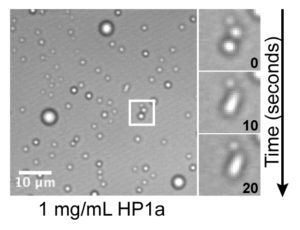
Purified heterochromatin protein 1a forming liquid droplets in an aqueous solution. Credit: Amy Strom
In a paper published June 21 in the journal Nature, Berkeley Lab Biological Systems and Engineering Division researchers Amy Strom and Gary Karpen provide evidence that liquid-liquid phase separation in the nucleus of cells plays an important role in how genes are regulated to be silenced or expressed. They observed that heterochromatin—an unusual part of DNA that generally must be silenced for cells to function properly—is sequestered in droplets that fuse together just like two drops of oil surrounded by water. Understanding this mechanism could open up a third of the genome that was previously inaccessible to genome manipulation and gene therapy, Karpen said. Read more in the News Center release.




